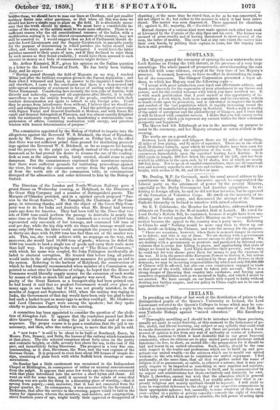SCOTLAND.
Her Majesty graced the ceremony of opening the new waterworks near 'Loch Katrine on Friday the 14th instant, in the presence of a very large assemblage. The whole passed off prosperously, notwithstanding the rain which fell with some violence, except at the very time of her. Majesty's presence. It scented, however, to have no effect in diminishing the num- ber of the concourse. The Glasgow Corporation presented a loyal ad- dress, to which her Majesty read the following reply-
" I accept with great satisfaction your loyal and affectionate address, and thank you sincerely for the expression of your attachment to my throne and person, and for the cordial welcome with which you have received me. It is with much gratification that I avail myself of this opportunity of in- augurating a work which, both in its conception and its execution, reflects so much credit upon its promoters, and is calculated to improve the health and comfort of the vast population which is rapidly increasing round the great centre of manufacturing industry in Scotland. Such a work is worthy of the spirit of enterprise and the philanthropy of Glasgow, and I trust that it will be blessed with complete success. I desire that you will convey to the great community which you represent my earnest wishes for their continual prosperity and happiness.' The Queen had left Edinburgh at ten in the morning, on purpose to assist in the ceremony, and her Majesty returned at seven o'clock in the evening, The works are on a grand scale.
Between Loch Katrine and Glasgow there are 13 miles of tunnelling, 3 miles of iron piping, and n miles of aqueduct. There are in the whole work 70 distinct tunnels, upon which 44 vertical shafts have been sunk for facilitating and expediting the completion of the work. The first tunnel commences immediately upon the aqueduct leaving Loch Katrino. It is 2325 yards in length, 600 feet below the summit of the hill, and has been worked in addition to the open ends by 12 shafts, five of which are nearly 500 feet deep. Not to speak of smaller constructions, there are 25 important iron and masonry aqueducts over rivers and ravines, some 60 and 80 feet in height, with arches of 30, 50, and 90 feet in span.
Mr. Dunlop, M.P. for Greenock, made his usual annual address to his constituents on Monday. In a discursive speech he congratulated the Liberal party on the attainment of power by the present Ministry, especially as the Derby Government had Austrian sympathies. In re- ferring to foreign affairs, he said he did not fear invasion, but he approved of the formation of Volunteer Corps. Ho dwelt on the necessity of in- creasing our Indian army, and denounced the attempt of the Roman Catholic hierarchy in Ireland to interfere with mixed education.
Sir E. T. Colebrooke, the Member for Lanarkshire, addressed his con- stituents on Tuesday in the Meal-market Hall at Lanark. He voted for Lord Derby's Reform Bill, he explained, because it might have been mo- dified; but he voted against the Earl's Ministry on the "no confidence" motion because the appeal to the country was a party move. Referring to China he said "Nothing would be more easy than to throw up our hats, decide on licking the Chinese, and vote the money for the purpose.
" [here are occasions, however, when there is as much danger in success as in defeat ; and this is one of them. We are dealing with a government unwarlike ; and there is nothing in recent success to alter our opinion. We are dealing with a government so prostrate and paralyzed by internal con- vulsions that it seems fast falling to pieces, and approaching that state of things we found in India. Lord Elgin describes their poverty, and he says he could not for very shame press them for money to pay the expenses of the war. It is in the power of the European Powers to destroy it, but unless some caution and forbearance are exercised by those great Powers in their demands, we may be incurring responsibilities by which not only 300,000,000 of Chinese will be affected, but also our own countrymen engaged in trade in that part of the world, which must be taken into account. There is a strong danger of throwing that country into confusion, and forcing upon ourselves responsibilities such as we incurred in India, and which I desire to see averted. We have enough on our hands with regard to India without desiring any further empire, and our policy in China ought not to be one of aggrandisement."


























 Previous page
Previous page